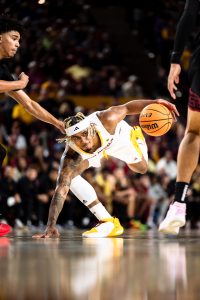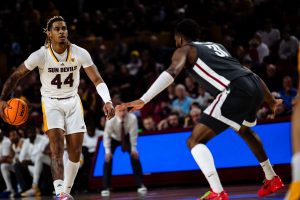- Slug: Sports-Transfer Portal Madness, 1,600 words.
- 3 photos available.
By Jayla French
Cronkite News
TEMPE – Frankie Collins has made his decision, leaving Arizona State’s men’s basketball team for Texas Christian University.
Collins’ experience with the transfer portal seemed short and sweet, 18 days to be exact. His transition going into his final year of eligibility should be a smooth one.
For his former teammate, ASU junior guard Adam Miller, however, it was a different reality. Miller spent much of last season waiting and worrying and waiting some more, wondering when he would be able to play for the Sun Devils, with much of that decision out of his control.
Miller is hardly the only college athlete who has had to learn how to navigate the NCAA’s intricacies. As soon as the 2023-24 college basketball season came to a close, and a new champion was crowned, all eyes turned toward the transfer portal and its rules that seem to change as quickly as a fast break.
The portal for both women and men opened on March 18, right before March Madness began, and since then 925 male college athletes and counting have entered. With 123 commits so far, two weeks remain until the portal closes.
The portal is on an upward trend this year in part because athletes are allowed to profit off their name, image and likeness (NIL), as well as not having to sit out a year before they are allowed to play. This is because of the preliminary injunction order in place regarding second-time undergraduate transfers.
Collins was one of those athletes.
Collins, a guard who played two seasons for the Sun Devils after spending his first year at Michigan, entered the portal on March 26 and has since committed to TCU to finish out his collegiate career. He will be able to transfer without having to worry about sitting for a year.
Miller wasn’t as lucky.
During the 2022-23 offseason, Miller entered the portal for the fourth time before landing at ASU, his third school. With his sights set on a new beginning in his college basketball career, an obstacle temporarily halted his dreams. In December 2023, Miller was temporarily benched because of changes to NCAA guidelines for second-time undergraduate transfers, which went into effect in January 2023.
Under the new rules, undergraduate students who do not qualify for the one-time transfer exception must undergo a waiver process that will only be considered for reasons related to the athlete’s physical or mental health and well-being, exigent circumstances outside of the athlete’s control (e.g. physical or sexual assault or discrimination based on a protected class), and assertions involving diagnosed education impacting disabilities, per the NCAA.
Ultimately, Miller failed to meet the requirements.
“When I found out my waiver was denied it was kind of heartbreaking,” Miller said. “I put in a lot of work – I kind of generate my passion, money, and stability from the game of basketball. It was like I said, heartbreaking not being able to play, hearing that my story wasn’t good enough to be a mental health issue so they’re not allowed to play basketball.”
Miller began his college career close to home in Peoria, Illinois, playing for the University of Illinois in 2020-21. Starting 31 games for the Fighting Illini, he averaged 8.3 points and 2.8 rebounds per game.
After one season with Illinois, Miller transferred to Louisiana State University.
He spent two seasons as an LSU Tiger but missed the 2021-22 season due to a torn ACL injury. In his second season, Miller was a starter in all 33 games, averaging 11.5 points, 2.3 rebounds, and 1.7 assists.
After Miller’s waiver was denied, he had to wait to see when he would be able to play again due to the guidelines stating that second-time transfers have to sit for a year after a waiver denial. Miller is just one of the many athletes in similar situations. RaQuan Battle and Noah Farrakhan, who both play for West Virginia University, became the face of a lawsuit against the NCAA. Before the lawsuit, Battle’s waiver was denied twice while Farrakhan, a second-time transfer, had not requested a waiver.
The lawsuit was filed out of West Virginia along with six other states and led by Ohio Attorney General Dave Yost, who argued that the waiver process violated the federal antitrust laws – specifically, Section One of the Sherman Antitrust Act.
Since the original filing in December, the Department of Justice and three additional states joined the lawsuit on Jan. 18.
The grounds for the suit are the NCAA violated its regulations on how athletes can profit from endorsements and public appearances.
In simple terms, this withholds college athletes from the opportunity to have control over NIL and education on their terms.
NCAA president Charlie Baker told ESPN in February that he doesn’t want college athletes’ autonomy taken away.
“I’m not much on that. I’m not,” said Baker, adding that college athletes aren’t the only ones who switch universities.
“Do they transfer more than they did 10 years ago? Yes,” Baker said. “Do they transfer more than their peers who aren’t student-athletes? No.”
With so much uncertainty around whether Miller would suit up this past season, he had great support from his teammates to ASU assistant coach Nick Irvin, with whom he has a personal connection.
“I think the best support that they gave me was for them showing that they weren’t going to give up,” Miller said. “At the end of the day, they were going to keep pushing on for me. I think they just played as hard as they could even through the struggles that was all I needed. I didn’t need anything specific and they were there when I needed them.”
Irvin, who has known Miller since he was in elementary school, was also his basketball coach for three years at Morgan Park High School in Illinois. The pair reunited at ASU after Irvin was hired as an assistant coach in 2022 and Miller transferred shortly after in 2023.
“I talked to him every day and I said, ‘God put you in certain situations where he’ll handle it and take care and just be prepared, just don’t think the worst, think the best outcome that’s going to come out of it,’” Irvin said. “We got a good relationship where I could talk to him and just keep his head focused and keep him on a straight path.”
Miller also expressed how much the support from Irvin means to him.
“Him being here has been a load off my shoulders,” Miller said. “Just knowing somebody else here cares for me and knows me. We spend a lot of time together and I feel like everybody in college needs somebody in their corner at the end of the day. College basketball is a business – you need people in this business who you can trust and he’s one of the guys I trust.”
When Miller decided to enter the portal, he felt drawn to ASU and had the sense that it would be a great fit for him.
“Every time I’ve hit the portal, I’ve kind of always thought about coming here,” Miller said. “This time it felt right – it just felt obvious to me that Tempe was the place for me and that I should be able to be happy here and be able to flourish.”
On Dec. 13, 2023, West Virginia judge Preston Bailey ruled in favor of second-time transfers with a 14-day restraining order. This meant they were able to play during those two weeks without punishment from their respective universities, which the NCAA complied with.
The restraining order was eventually upgraded to a preliminary injunction, which remained in place until the end of the 2023-24 season. Following the decision, Miller was able to make his debut with ASU midway through the season.
In 21 games, Miller had flashes of brilliance for the Sun Devils, averaging 12.4 points per game.
Throughout his experience with the transfer portal, Miller had time to reflect on the lessons he was taught and what he’s learned about himself.
“I learned mannerism, maturism, and just being a man,” said Miller, who is working on a general business degree. “We’re in college and (when) some things don’t go your way, you got to roll with the punches. I realized how important school was to me and getting my degree, so just making sure that I take advantage of every opportunity I’m getting in college. I feel like that’s what everybody should do and that’s what I’m trying to do.”
The restrictions on the current guidelines can make athletes feel stuck in uncomfortable situations, sometimes resulting in additional harm to their well-being. The preliminary injunction order is in place until the end of the 2023-24 academic year. No trial date has been set for the courts to decide on the merits of the case.
“I’ve always been a firm believer that if a kid doesn’t want to be at a university, so be it,” Irvin said. “Just let them be because you want players who want to play for you and want to be around you. Just let them play, that’s how I look at it, and I know there’s got to be rules and stipulations to it but at the end of the day, just let them play.”
For more stories from Cronkite News, visit cronkitenews.azpbs.org.


